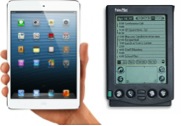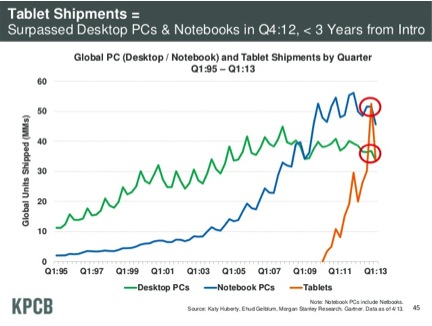"Whip," Walter echoed.
"So there's an iPhone app for fighting zombies. Interesting…"
— Amelia Beamer (The Loving Dead)
It has only just been a decade since the masses have embraced the ability to make a call to friends, family, or their place of work wherever they were located, all from a device that could fit inside their pocket. As commonplace as the mobile phone feels nowadays, technology has rapidly evolved into the ability for individuals consume and disseminate information at an instant’s notice.
Apple’s creation of the iPad has finally disrupted the mobile and computing industry to a truly mobile landscape. With the creation of a portable touch screen tablet unbound by the shackles of non-portable PCs and cumbersome laptops, and a screen able to engage a user in a larger window than standard mobile phones. It has exploded in popularity, with sales now in the millions. Besides being utilized for personal use and entertainment, the iPad has permeated businesses as well.
One of the businesses that has quickly adapted to the iPad is the healthcare industry, particularly the medical device and pharmaceutical industries. One cannot go to a medical conference today without seeing sales reps armed with iPads at the booths, ready to show customers the newest medical technologies with a swipe of a finger.
But is the iPad just a fad? Doomed for failure as the Palm Pilots of old?
Does the iPad matter? In this article we discuss some of the reasons why the iPad does matter, and in fact why it is a promising long-term solution in the healthcare industry.
Adoptability
At Apple’s iPhone 5 event in September of 2012, Apple CEO Tim Cook touted some pretty impressive numbers for the iPad: 84 million sold through June of 2012, with 94% of Fortune 500 companies adopting the iPad into their companies.
In Q1 of 2013, Tablet shipments surpassed Desktop/Notebook shipments for the first time.

An article by the Wall Street Journal discusses how the medical device industry in particular has taken to the iPad:
“There appears to be something of an iPad arms race in the $200 billion medical-devices sector. Heart-device maker Boston Scientific recently bought 2,000 for its sales team, and orthopedics company Zimmer Holdings Inc. is rolling out more than 1,000 of the tablets.”
“Medtronic, a Minneapolis-based maker of implantable heart devices and other products, recently bought 4,500 iPads for its sales and marketing team, making it one of the iPad's biggest corporate buyers.”
With medical and device and pharma industries purchasing iPads by the thousands, one of the motivating factors why these companies are buying the iPad by the busload can be summed up in one word: sales.The Sales Advantage
Any medical device or pharma company will extol the importance of their sales force. It is their face time with the customers that help drive the sales of the company’s product. On many occasions, marketing and sales representatives literally only have seconds to pitch their product in a doctor’s already busy schedule. Many medical device industry leaders I have spoken to throughout the years have mentioned the all-important 10 second elevator pitch: literally the only the time a physician may have in their day to listen to a salesman pitch their latest medical device or drug. The iPad allows for innovating and engaging ways for reps to disseminate this relevant product information to doctors, without having to worry about long boot times and wasted moments in which an interested doctor may lose interest.
A representative from Novartis states:
“…iPad use will save sales teams 250 hours a year allowing for 35,000 more customer visits.”A recent article by the Manhattan Research Group lists some telling trends in its research regarding the advantages of the iPad aided interactions with doctors and its relation to increased sales :
“…among ePharma Physicians interacting with an iPad Rep, 35 percent say they are more likely to request a sample and 29 percent say they are more likely to consider prescribing the drug”
“iPad Rep audience doubled between 2011 and 2012 – among ePharma Physicians who have seen a pharma sales rep in person, 65 percent have interacted with one carrying an iPad”
Based on these numbers, the iPad is becoming a key tool in the arsenal of the sales force for physician interaction. In an interview with Apple, Linnea Burman, the Marketing Director for Drug Delivery Systems at Medtronic says the following of the iPad:
“For field-based employees, iPad is an essential device. The battery lasts throughout the day, and the Multi-Touch screen gives us a better way to organize information. Whether they’re presenting clinical articles or patient videos, the screen size on iPad is fantastic for our sales partners…. At the end of the sales call, they’re able to email the appropriate material as they walk out the door, rather than wait until the end of the day”
Why are so many doctors drawn to the iPad when being pitched a new medical device or drug? One of main factors is the new levels of interactivity and user engagement it allows for.
Product Engagement
The design of the iPad is simple and intuitive by design. Having only one physical button on the face of the device (the Home button) subconsciously invites the user’s fingers to interact with the touchscreen interface. This makes navigating the interface and applications much easier and fluid, opening its usability use to all sectors in the healthcare industry.
Monica Levy Vice President of Research at Manhattan Research recently conducted a study on the use iPads in healthcare. Levy states: “Pharmaceutical reps call up informational content on the iPad that helps doctors decide if drugs are a fit for their patients' needs. Physicians are looking to learn more about how a drug works or get an understanding of a disease process”
The physical restrictions of a keyboard and mouse have been replaced by intuitive and natural finger gestures. This has transformed the use of the iPad to much more tailored, personal experience: Relevant product information, charts, and graphs can be called on screen in a moment’s notice with a the touch of a finger. Many companies are also building Interactive apps and 3d medical animations on the iPad, highlighting the mechanisms of action for their product that can be used to further engage physicians as well:
“iPad helps us communicate with clinicians; it helps our stories come to life. The sales representative can pull up information quickly and use graphics to tell a story in a very memorable way.”
- Linnea Burman, Marketing Director, Drug Delivery Systems,Medtronic
Already touched upon briefly earlier in this article, the iPad’s mobility is another factor of why it has made its impact in the industry.
Information at Your Fingertips
The iPad’s light weight and form factor make it the sensible tool for the medical professional on the go. Instead of having to worry about lugging around and powering up a laptop to get to an important product presentation, a rep can quickly cue up the presentation with the touch of a finger almost instantly. It’s long battery life also means the sales and marketing teams are able to relay information to its customers at any time:
“With iPad, it’s easier than ever for Medtronic to deliver its message of medical innovation to physicians and patients everywhere. “iPad has given us a whole new sales and marketing interface...It’s changed the way we think about getting information out to the public. With iPad, our sales organization has the right information, at the right time, for the right customer, every day.”
- Linnea Burman, Marketing Director, Drug Delivery Systems,Medtronic
Conclusion
Not only does it seems that the iPad is here to stay for the foreseeable future it aims to be the missing link in the ever challenging need for the medical device industry to connect with its customers. With its immersive interface and application possibilities, it can be safe to say that yes, the iPad does indeed matter in today’s healthcare industry. Given the unprecedented adoption and use, not being on the tablet bandwagon may actually put you on a competitive disadvantage!

Virtual Reality in Healthcare: A Primer
The power of Virtual Reality technology lies in the fact that it isolates its user from the real world and immerses him/her in a world that is completely fabricated, without any boundaries. The 360-degree view of the new world allows little or no sensory input from the environment where the body is actually in. Read More..








